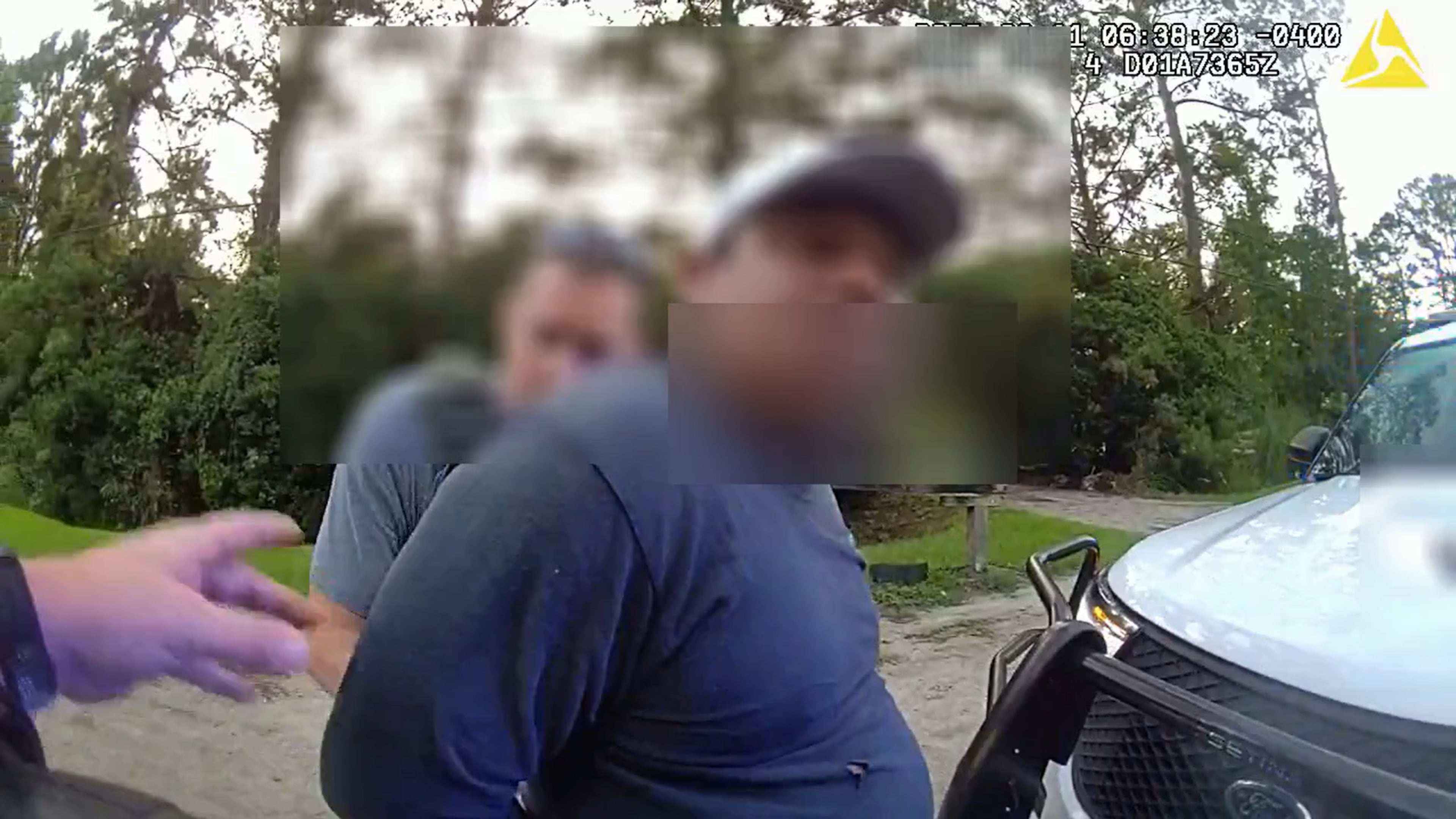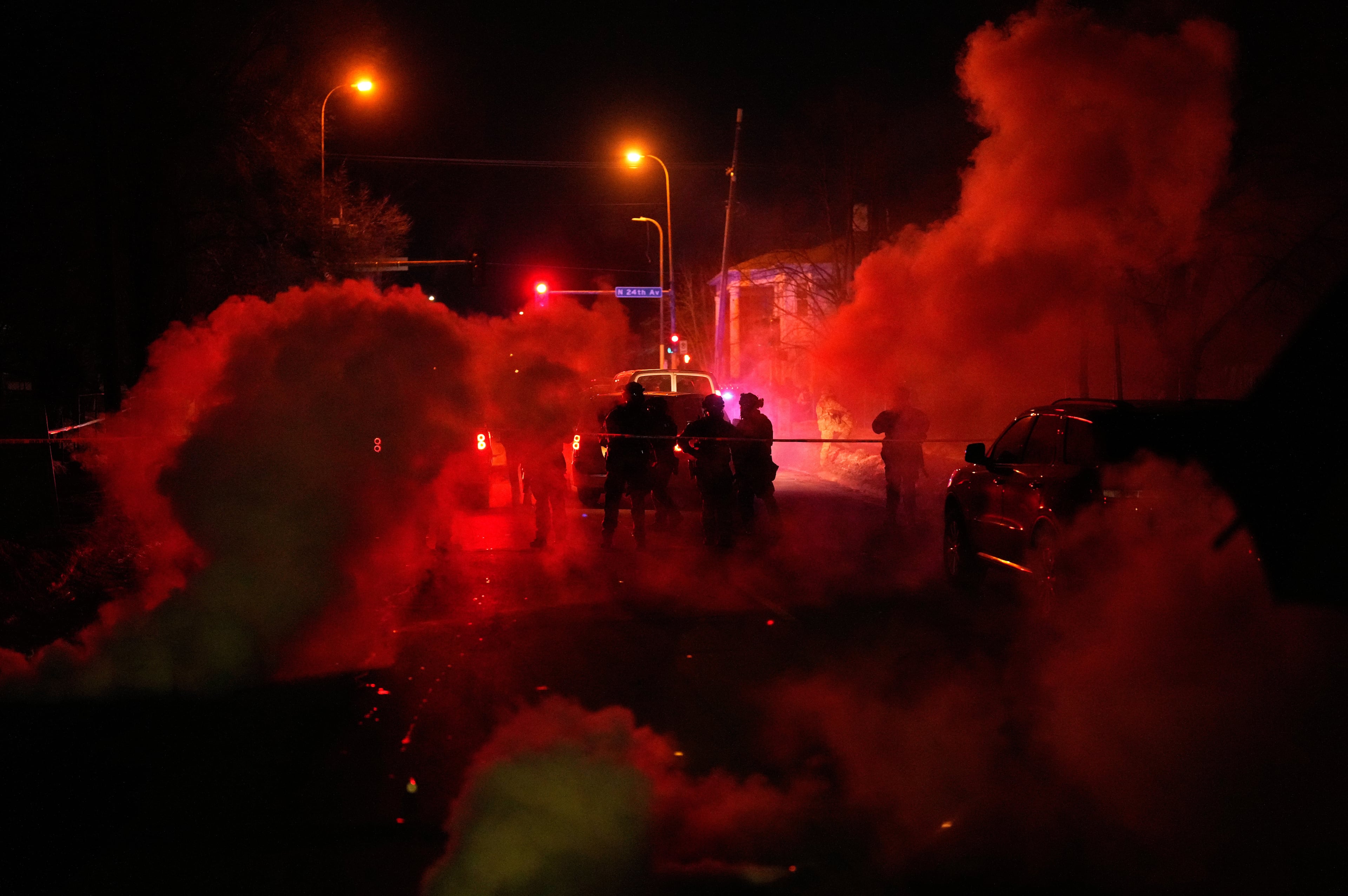‘Easy money’: How ICE teamed up with police to arrest immigrants in Savannah

Around an hour after dawn on June 11, Immigration and Customs Enforcement agents positioned themselves near a majority-Hispanic mobile home park outside Savannah.
Two traffic stops and just a handful of minutes later, ICE apprehended eight immigrant laborers on their way to work, with the help of local police officers.
The close collaboration between ICE and the Chatham County Police Department alarmed Georgia immigrant rights advocates. But police’s involvement also exposed federal agents to a level of public scrutiny they are typically unburdened by.
Body camera footage requested by The Atlanta Journal-Constitution from Chatham County authorities provides a rare, close-up look at the behavior of ICE agents when questioning and arresting immigrants in the community.
Filmed moments of candor from the immigration officers also reveal how highly ICE values cooperation with local law enforcement and how eager the agency is to continue patrolling the immigrant-heavy neighborhood where the June 11 arrests took place.
“Anytime you want to do this … you just call me,” one of the ICE agents included in the footage is heard saying to a Chatham County officer while riding as a passenger in the policeman’s patrol car. The pair had just arrested two Mexican nationals.
“Or just call me on the side of the road,” the federal agent said. “Be like, ‘Hey, you free? Because I got one right here.’ And I’ll drive to you.”

A comment from the ICE agent involved in the second traffic stop on June 11 gave context for the early-morning start time of that day’s operation.
During a previous outing, not with Chatham County police, the ICE agent stated “we only got, like, one” arrest.
“It was not as effective. We started a little too late, I think. They wanted to start at 7:30, and everyone’s already got to work by then.”
Two vehicles were pulled over June 11 — a pickup truck that bore the insignia of a local landscaping company and a white cargo van of the kind used by many immigrant construction crews.
With ICE in tow, police pulled over the van because it had allegedly rolled through a stop sign. The pickup truck was stopped because police deemed that the license plates for it and a utility trailer were obscured.
Police reports of both traffic stops identify the names of the Chatham County officers involved but redact the names of the two ICE agents they partnered with. The body camera footage obtained by the AJC blurs the faces of the ICE personnel, who appeared to be unmasked during the June 11 operation. Several minutes of the footage were muted.
Video of both stops shows Chatham County officers engaging with the people behind the wheel to explain why they were pulled over. As that happens, the ICE agents are seen questioning and arresting the vehicles’ passengers before circling back to the drivers.
During the white van traffic stop, the driver, Rodrigo Espitia-Ibarra, asked Chatham County Officer Kirby Pulliam if his passengers were going to be arrested. At the time, the ICE agent working with Pulliam was handcuffing the woman who had been riding in the passenger seat, with another officer’s help.
“I’m not sure what they’re doing. I’m dealing with you for a traffic stop,” Pulliam replied.

Conducting traffic stops with local police is a way to “encounter somebody legally,” one of the ICE agents is heard explaining in the footage.
On its own, ICE does not have the statutory authority to make stops over traffic or vehicle violations. Instead, immigration agents may only pull over cars if they have a warrant or a reasonable suspicion that the driver or passengers are in the country illegally.
Should the friends or family members be called to come pick up their vehicles, “we can turn picking up the vehicle into another arrest” if they are deemed to likely lack lawful status, an ICE agent is heard explaining to Chatham County police.
The body camera footage also captures conversations between the two ICE agents and the immigrants in the vehicles. Among the first questions asked by ICE is: “When did you cross the border?”
According to Stacy Ehrisman, an immigration attorney based in Gwinnett County, the aim of that question is likely to determine whether the people encountered by ICE are subject to expedited removal, a fast-tracked deportation for those who entered the country illegally less than two years ago.
Before Trump’s return to office this year, expedited removal only applied to migrants who had been in the U.S. illegally for two weeks or less.

When advising members of the immigrant community on how they should behave if encountered by ICE, advocates tend to urge people to remain silent. Know-your-rights cards available in Ehrisman’s Lawrenceville office include the reminder to “never lie, hand over false documents or documents from another country.”
“The burden of proof is on ICE to prove that the person is a noncitizen,” Ehrisman said. “If you hand over a foreign document, you are doing their job for them.”
That’s what Maximo Morales Sales, the driver of the pickup truck, did.
“I asked him if he was born in this country, and he said he wasn’t. I was like: ‘Well, do you have identification from your country?’ And he handed me his passport. And there you go, easy money,” the ICE agent who apprehended Morales Sales explained to Chatham County Officer Adam Tilley following the arrest.
The June 11 operation took place in the Quacco Road area, known for its large Hispanic and immigrant population. Days before June 11, that part of metro Savannah had served as the site of an anti-ICE protest.
One of the ICE agents is captured repeatedly remarking on the speed with which the operation netted eight immigration arrests.
“Man, that was the quickest thing ever,” he said.
“I’m telling you, man, Quacco is something else,” Tilley, from the Chatham County Police Department, replied.
“I expected this to go well. … We didn’t even get a chance to get to know each other,” the ICE agent added. “Now, we need to do this again.”
“That’s what I was going to ask. Are you guys coming back out to Quacco? You could do this every day,” Tilley said.
“Nothing would make me happier,” the ICE agent replied.

As he rode in the passenger seat of the Chatham County patrol vehicle, the ICE agent noted that an additional benefit of cooperating with local police is avoiding heckles from members of the public who recognize ICE vehicles.
“They always film as they drive by and they post,” the agent said. “And they are tracking exactly what we drive. As a matter of fact, sometimes we’ll be working out here, we’ll put somebody on the side of the road … and people will roll down the window because they identify the car and yell profanities.”
Amid the growing propensity of ICE agents wearing masks in public, federal immigration officials have said that staff on the ground are facing a sharp uptick in attacks.
“It is reprehensible that our officers are facing this threat while simply doing their jobs and enforcing the law,” Department of Homeland Security Assistant Secretary Tricia McLaughlin said in a statement.
Following the traffic stop involving the pickup truck, Tilley drove the ICE agent and the two men they arrested to an undisclosed location for ICE to take custody.
“Glad I could help,” he told the ICE agent as they parted.


